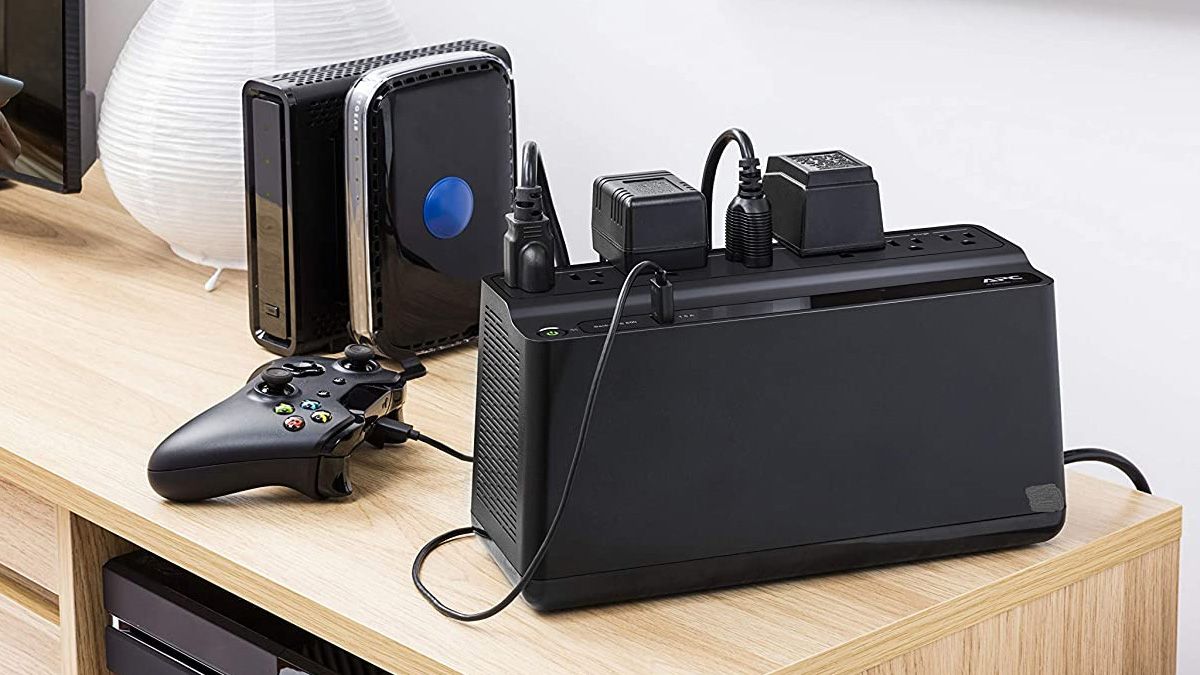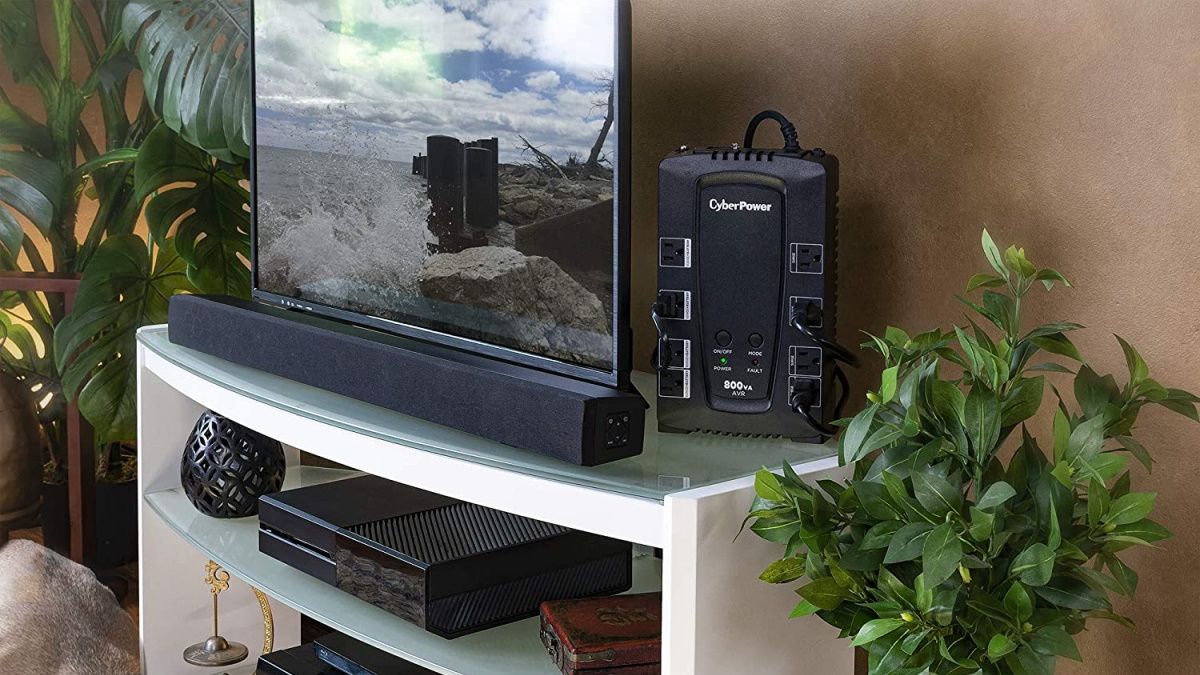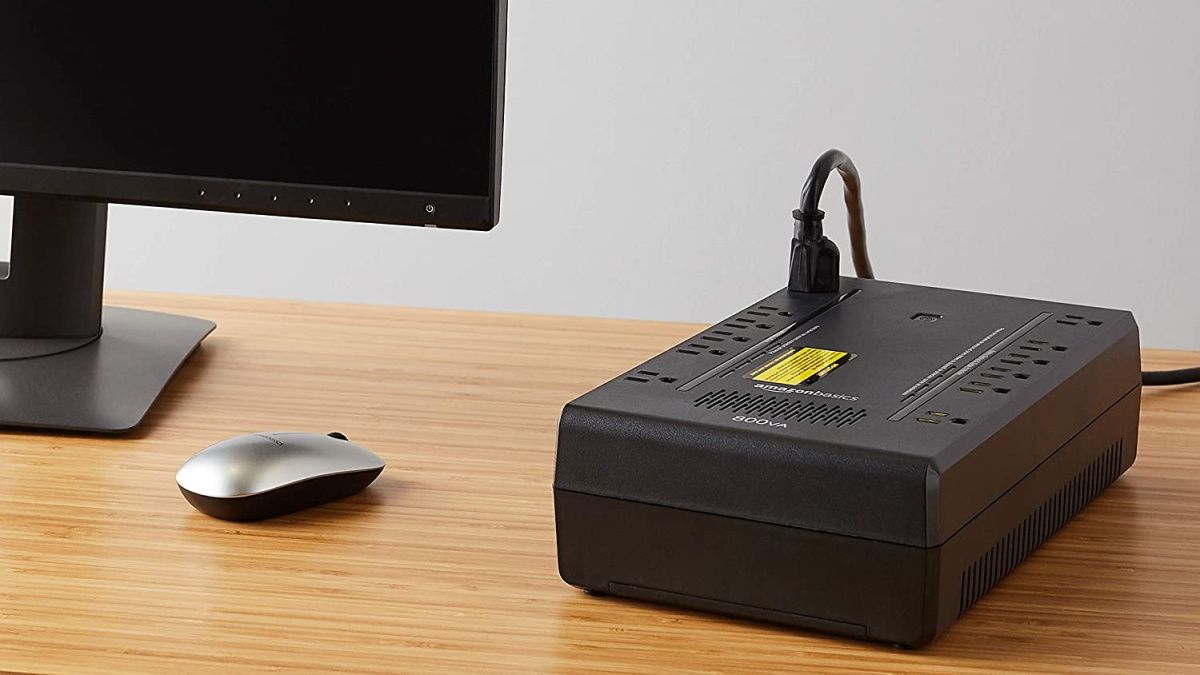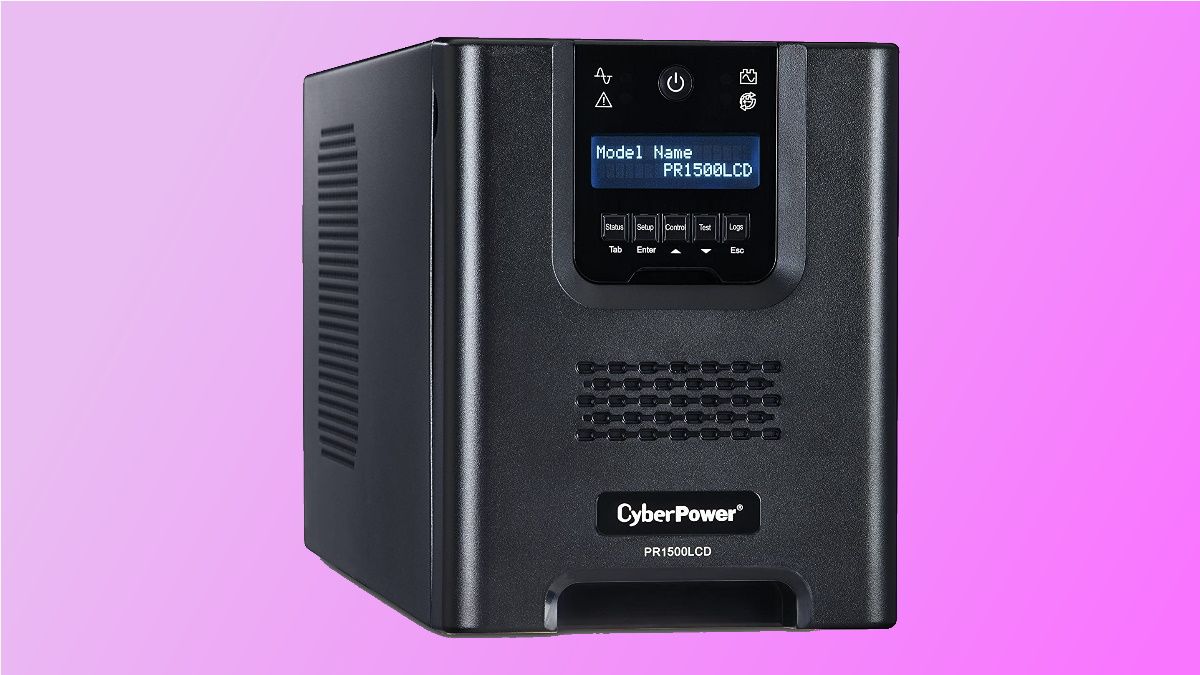A power failure is more than an inconvenience—it can knock out essential equipment for hours on end. If you have important electronics that have to keep running when the power’s out, you’ll need an uninterruptible power supply (UPS).
UPDATE: 10/08/2024
We’ve reviewed our recommendations and are confident these are still the best UPS devices you can buy.
What to Look For in an Uninterruptible Power Supply (UPS)
Many smart devices have built-in battery packs, with modern laptops packing enough cells to last a whole day. However, typical desktop computers, routers, and similar devices still need to be plugged into a power source all the time to work.
That’s where an uninterruptible power supply (UPS) comes in. Its main function is to act as a big battery that powers your devices when your electricity goes out. They range from small units that can sustain a few low-power devices to big house units for entire homes.
Battery capacity (usually denoted by the power rating in watts) should be the primary focus when getting a UPS. A sub-1000W UPS should be good enough for most appliances, but if you have really powerful systems like a gaming rig, you might want to look beyond the 1000W mark.
Once you’ve sorted the capacity, you need to evaluate the devices you’d be connecting to the UPS, specifically their sensitivity to signal fluctuations. Sensitive equipment like some newer LED TVs, CFL light bulbs, and audio equipment perform best on a pure sine wave. In this case, you’d need a UPS with a pure sine wave output. However, most other devices, including laptop computers, cell phone chargers, and any equipment that uses an AC/DC adapter, will usually work fine with a modified sine wave output.
You should also consider the UPS’s ability to protect your appliances. Most options come with built-in surge protection, so you can rest assured that sudden jolts of electricity won’t phase your connected devices.
But just as important is the presence of automatic voltage regulation (AVR) to keep your devices safe from minor power fluctuations throughout the day. The absence of AVR does not necessarily spell doom for your devices, but your UPS will have to kick in battery power more often, resulting in faster wear.
Size is another factor to consider when getting a UPS. More often than not, a higher capacity will translate to a bigger device. But factors like outlets and the presence of additional technologies play a role. That said, a larger device does not necessarily equal more ports.
With these factors in mind, here are our favorite UPSs for every price point and use case.
|
How Did We Research |
||
|
Models Evaluated |
Hours Researched |
Reviews Analyzed |
|
13 |
7 |
9 |
How-To Geek’s product recommendations come from the same team of experts that have helped people fix their gadgets over one billion times. We only recommend the best products based on our research and expertise. We never accept payment to endorse or review a product.
Read More »
|
Pros |
Cons |
|---|---|
|
✓ Visible backlit LCD |
✗ Lacks USB ports |
|
✓ Numerous (up to 10) outlets |
✗ Large and heavy |
|
✓ Swappable batteries |
✗ Step approximated sine wave like cheaper options |
|
✓ Option to connect additional batteries |
|
|
✓ Smart vertical orientation minimizes space taken |
Our pick for the best UPS overall goes to the APC BR1500G Backup Battery. At 1500VA/865W, it can power most devices, including computers, external hard drives, and wireless routers, from a few minutes to several hours, depending on the total connected load. This should give you enough time to wrap up your work, save your work, and shut down your computer gracefully.
The device has an automatic voltage regulator (AVR) to protect the battery from power fluctuations. It also has a built-in surge protector to safeguard your connected devices from abnormal jolts of electricity.
The APC BR1500G Backup Battery is pretty large in terms of size. It has five battery backup and surge-protected outlets and another set of five outlets with only surge protection, for a total of ten. However, there are no USB ports to plug in your phone directly.
There’s also a small backlit LCD that shows plenty of information at a glance. However, you can get even more details by installing the bundled Windows PC power-management software that comes with it.
The APC BR1500G Backup Battery is made even more special by its ability to hook up to an external battery backup to double the power. This could be useful if you connect more devices or need to power existing appliances for longer. Plus, if the battery runs out, you can replace it easily.
Unfortunately, it uses a simulated sine wave rather than a pure sine wave, which can cause sensitive audio/video equipment and satellite systems to perform poorly.
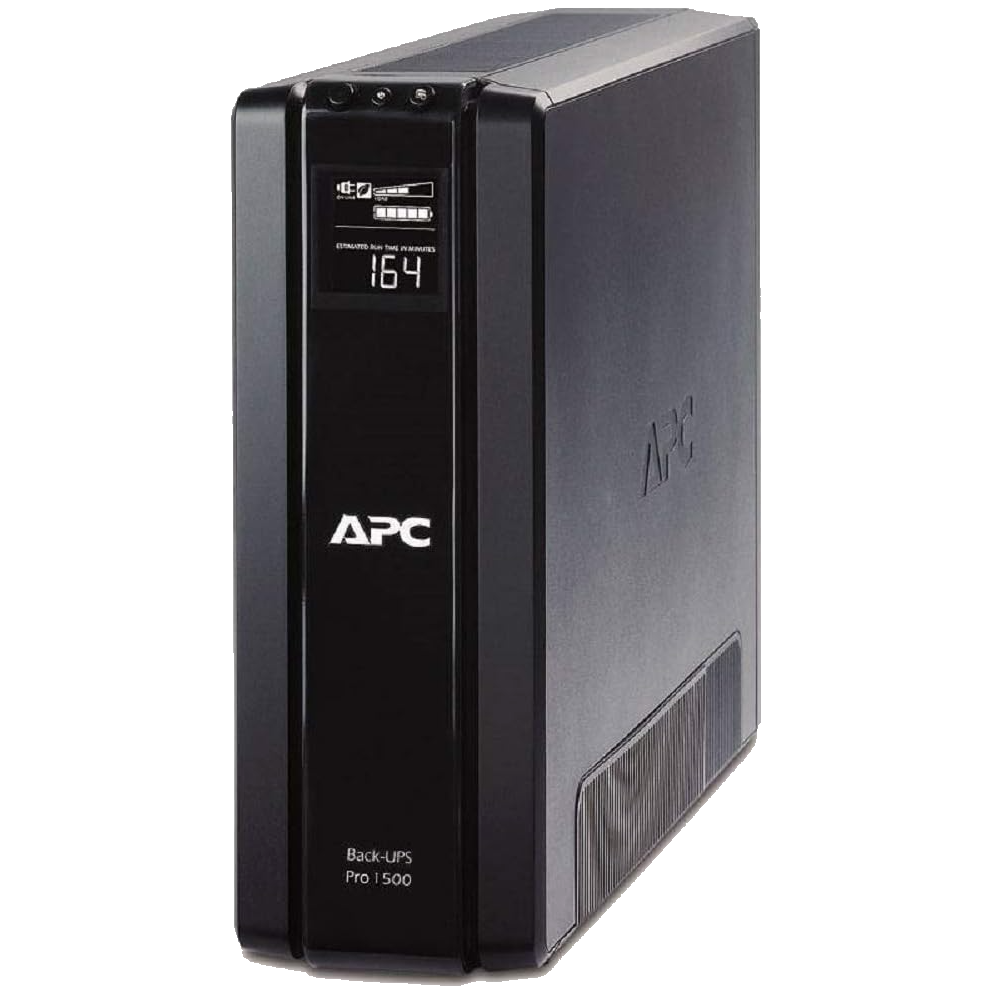

Best UPS Overall
APC BR1500G Backup Battery
$290 $317 Save $27
The APC BR1500G is an excellent battery backup with AVR and surge protection. It allows for easy cell replacement and the ability to add external backups.
|
Pros |
Cons |
|---|---|
|
✓ Small footprint |
✗ No Automatic Voltage Regulation |
|
✓ Inexpensive |
✗ No USB port |
|
✓ Great for small equipment |
If you need a UPS and don’t want to spend a lot, the APC UPS BE425M Battery Backup is for you. Its 425VA/225W power won’t keep your desktop computer running for several minutes after a blackout, but it’s perfect if you have a few smaller devices you need to keep powered up.
The device is small enough to fit on a desk, which is great if you’re limited on space. It has six total surge-protected outlets (of which four are battery-backed). Unfortunately, however, there are no USB ports to plug USB-A or USB-C cables directly into.
Like the APC BR1500G, the BE425M lacks a pure sine wave output. But that shouldn’t be an issue for most devices you’d be plugging into it. The other downside is that there’s no automatic voltage regulation, so you’ll miss out on being protected from electricity fluctuations.
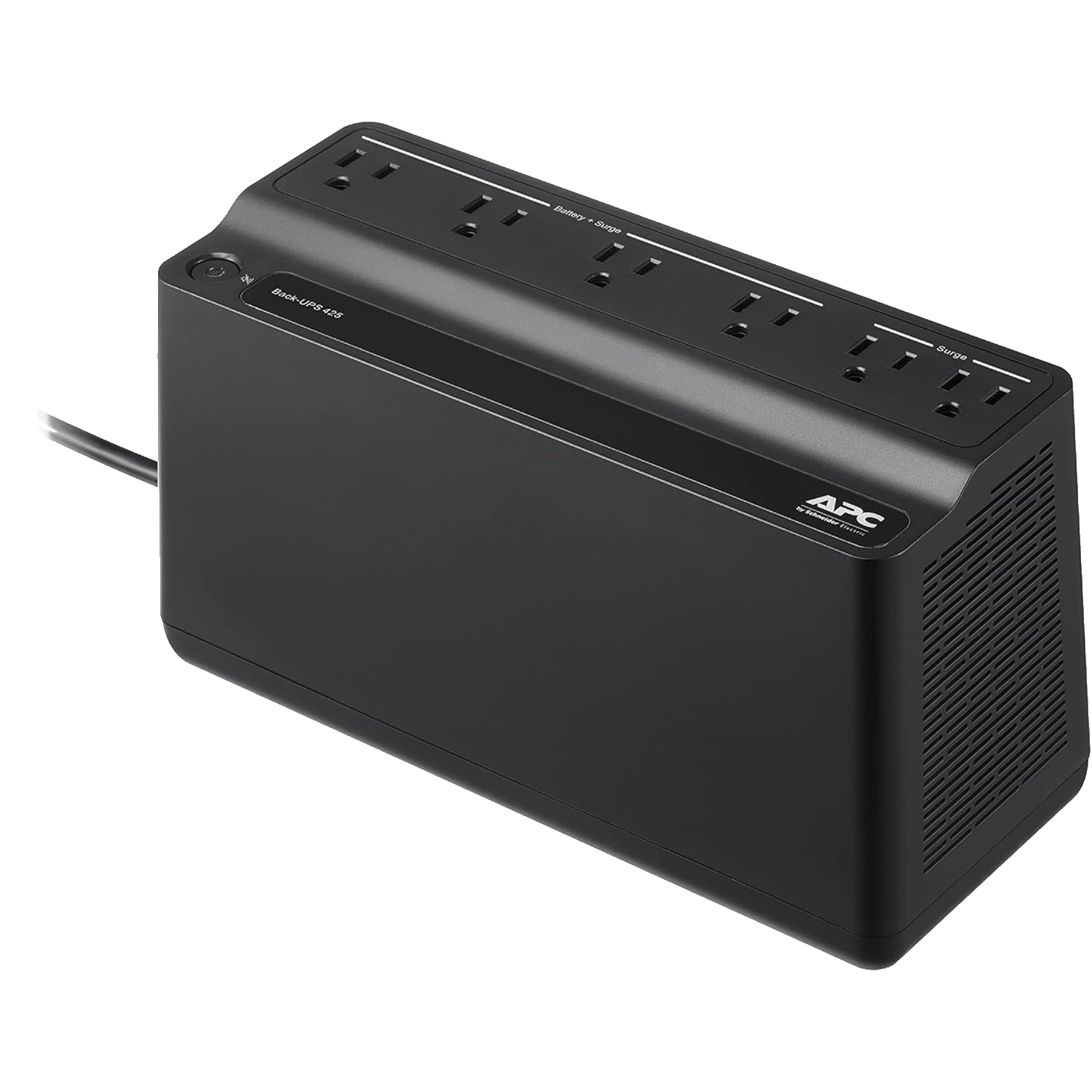

Best Budget UPS
APC UPS BE425M Battery Backup
$59 $76 Save $17
An inexpensive UPS with a small footprint. It provides enough power to keep small devices running for more than an hour (at 100 watts) after a power failure.
|
Pros |
Cons |
|---|---|
|
✓ Plenty of power for networking gear |
✗ No USB ports |
|
✓ Automatic Voltage Regulation |
✗ Simulated sine wave |
|
✓ Widely spaced plugs |
|
|
✓ Can be oriented vertically to conserve space |
Most laptops have a long enough battery life to last anywhere from a few hours to an entire day. So, if you don’t have a larger, more power-hungry desktop, you only need a smaller UPS battery backup to power your routers and networking gear and keep your internet up during a blackout. And the CyberPower CP800AVR UPS System, rated 800VA/450W, is perfect for just that.
The UPS has four outlets with battery backup and surge protection and four with just surge protection. Four outlets are nicely spaced out, so you can easily connect devices with larger plugs. Unfortunately, this UPS does not have USB ports, so the eight A/C outlets are all you’ll get.
There’s automatic voltage regulation to fix minor power fluctuations throughout the day without involving the battery. However, the CP800AVR uses simulated sine waves rather than pure sine waves, so don’t plug expensive A/V equipment into it if you want those to perform at their best.
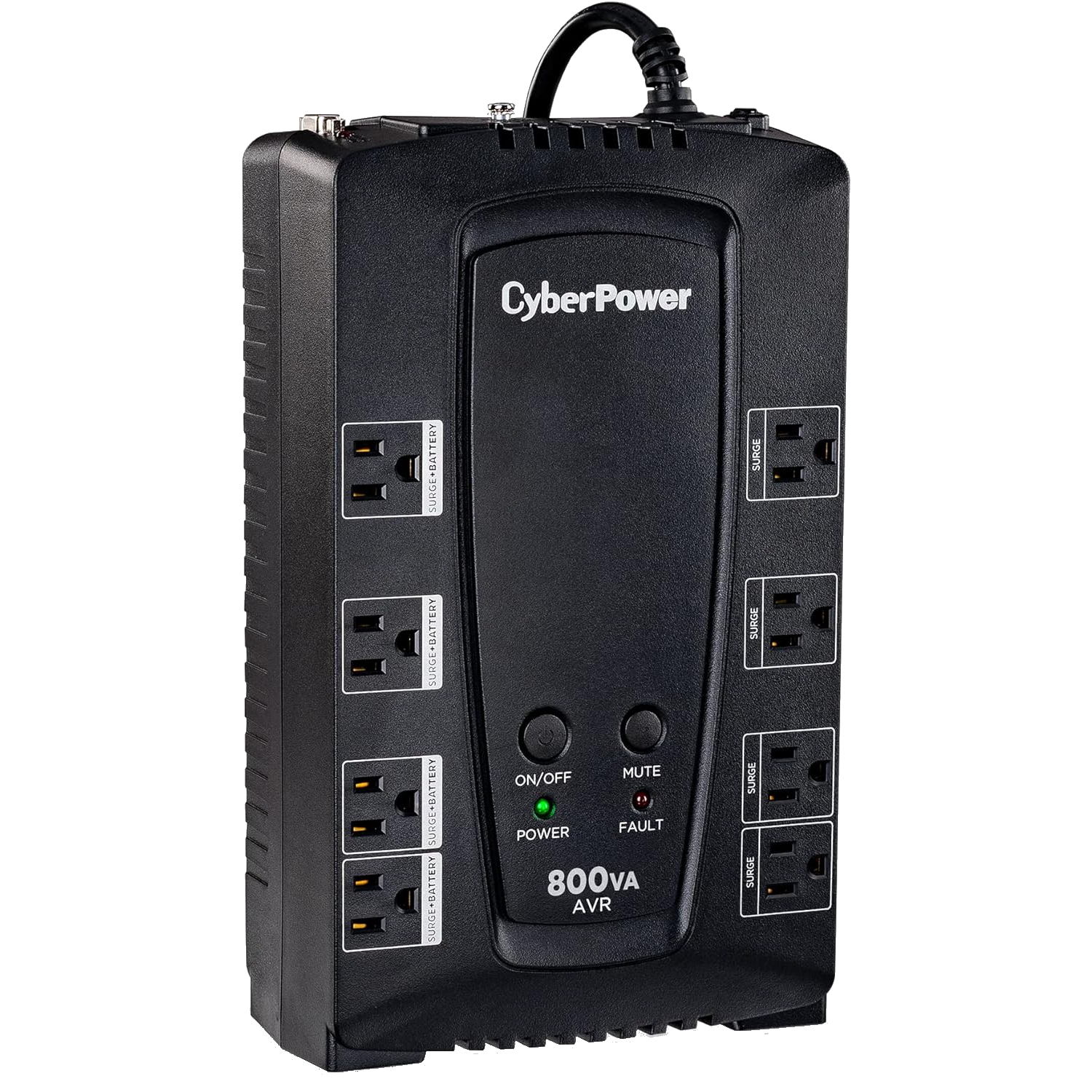

Best UPS for Networking
CyberPower CP800AVR UPS System
$118 $125 Save $7
450W provides enough juice to keep routers powered for a really long time. Plus, there’s surge protection and AVR at a low cost.
|
Pros |
Cons |
|---|---|
|
✓ 12 well-spaced outlets |
✗ No AVR |
|
✓ Small footprint |
✗ Simulated sine wave output |
|
✓ Powerful surge protection |
The Amazon Basics Standby UPS is great for those who want a UPS compact enough to fit in a small space but packs decent power for their equipment. It measures 12.2x7x3.14 inches, or about the size and shape of a dictionary lying flat.
Despite its size, the Amazon Basics UPS has 12 outlets, two more than the larger APC BR1500G. All outlets are surge-protected, while six are connected to the battery. The outlets are decently spaced, with four far apart enough to accommodate extra-large plugs.
Rated at 800VA/450W, it has enough power output for simple equipment. It should even power a PC, albeit for a very short time. There’s no AVR protection from power fluctuations, but it uses standby power management to help regulate voltage.
The standby power management should be okay if you don’t have any sensitive equipment, but it will drain the UPS’s battery in the long run. However, the device has a solid surge protector to protect your appliances from wild electrical waves.
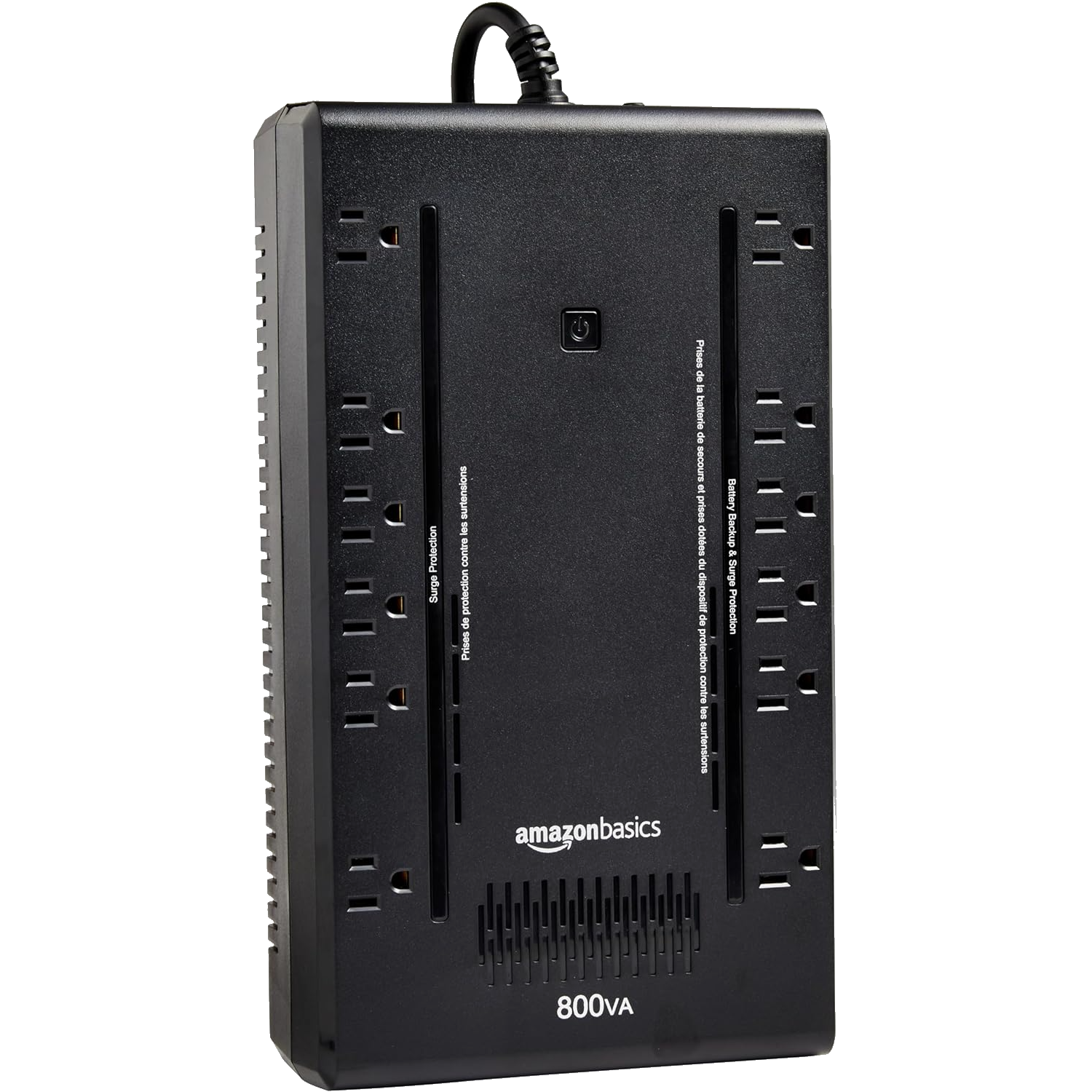

Best Compact UPS
Amazon Basics Standby UPS
$61 $80 Save $19
A bare-bones compact UPS with unbeatable dimensions for the power. Plus, it has all the essentials and way more outlets than you know what to do with.
|
Pros |
Cons |
|---|---|
|
✓ Large capacity |
✗ High cost |
|
✓ AVR |
✗ Huge footprint |
|
✓ Pure sine wave |
|
|
✓ Handy LCD control panel and software |
Gaming setups easily consume hundreds of watts of power, although a powerful rig could surpass the 1000-watt mark. If you’ve got a power-hungry setup, you need a UPS that can take all that brunt without dying as soon as the power shuts off. That’s where the CyberPower PR1500LCD UPS System comes in.
Rated 1500VA/1500W, this CyberPower UPS is perfect for high-power-consuming equipment like gaming systems. It easily outlasts options with similar volt-amperes (VA) but less wattage, including those rated 1500VA/1000W or 900W.
Unlike our previous picks, it has eight battery-backed and surge-protected outlets. But the CyberPower PR1500LCD is not just a beast in raw power. It provides a true sine wave output as you’d get from the power grid, making it great for sensitive gear. There’s also support for AVR, which protects your gear from minor fluctuations without having to call in the battery power.
The downside is how much all of this costs the unit. It’ll set you back more than $500, far more expensive than any other option on this list. But if you can look past that, you’ll quickly find it’s worth the cost.
As with most UPS battery backups, more power comes with a larger footprint, and the CyberPower PR1500LCD is no exception. When stood up, it’s more than 1.5 times the width of our best overall recommendation, which is not small in and of itself.
But if it’s any consolation, the size has been put to good use, with a handy LCD control panel for monitoring its status. Plus, with the bundled Power Panel Business Edition software, you can easily monitor all the minutiae of the UPS from afar using only a web browser.
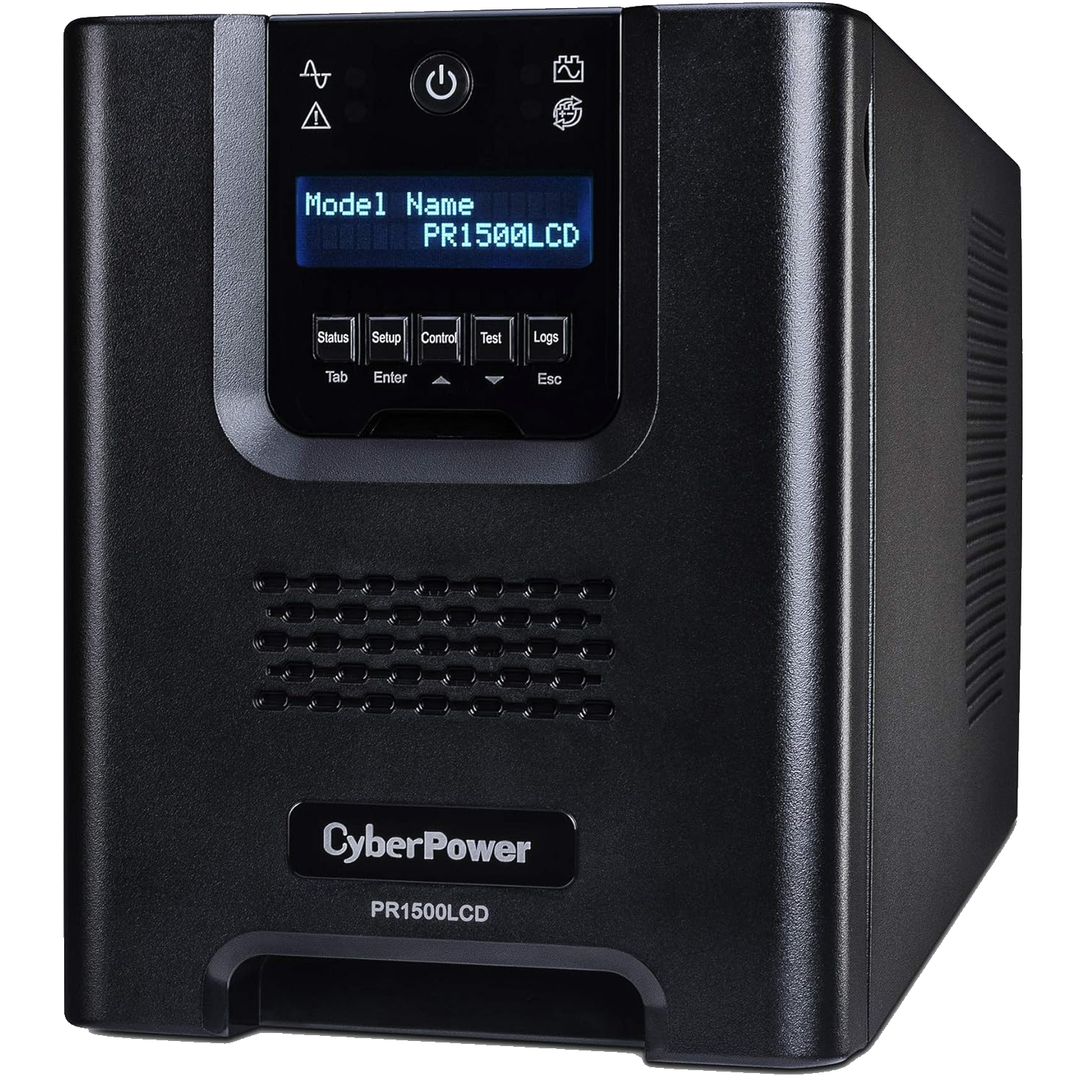

Best UPS for Gaming
CyberPower PR1500LCD UPS System
The large 1500W capacity makes it perfect for high-power draw equipment like gaming systems. In addition, it has AVR and surge protection and provides a pure sine wave output.
FAQ
How long does a UPS last?
A typical UPS can last anywhere between one and five and a half hours, depending on the model you purchase. Meanwhile, the lifespan of a typical UPS is about three to five years, depending on how well it’s taken care of.
Are UPSes dangerous?
Nowadays, UPS batteries are equipped with safety precautions that help to protect it from shorts or battery exposure, so while it’s unlikely something will go wrong, you’re still dealing with a massive supply of power. If something like the input transformer—which isolates the batteries from the ground reference and prevents voltage from traveling between the DC bus—were removed, there’s a chance that a short will occur and carry the current’s flow through any conductive material it touches, including humans, which could lead to serious injury or death. You also have to ensure you take good care of the UPS and keep it in a cool, dry environment to prevent accelerated aging which could cause the batteries to leak or explode over time.
How does a UPS work?
A UPS’s job is to provide power to the devices connected to it if a primary power source is cut off or the voltage reaches extremely low levels. Primarily designed for things like PCs and network systems, it’s basically a huge battery that works as a middle ground between standard AC power and a generator. While no UPS is big enough to keep your electronics on for days at a time, it will be enough for at least a couple hours until either your generator kicks in or you can safely shut down the electronics attached to it.
Is a UPS useful for blackouts?
A UPS is great if you’re looking to protect your electronics from blackouts. If you experience one, the UPS will give you plenty of time to save work on your PC or finish projects on other connected devices before shutting them down.


